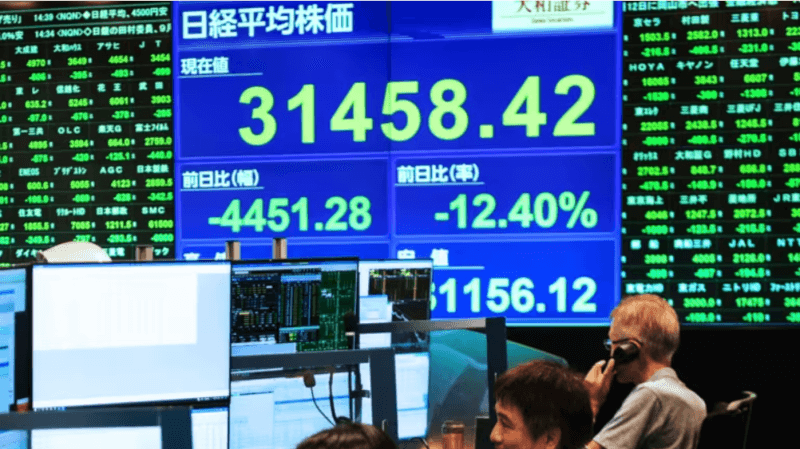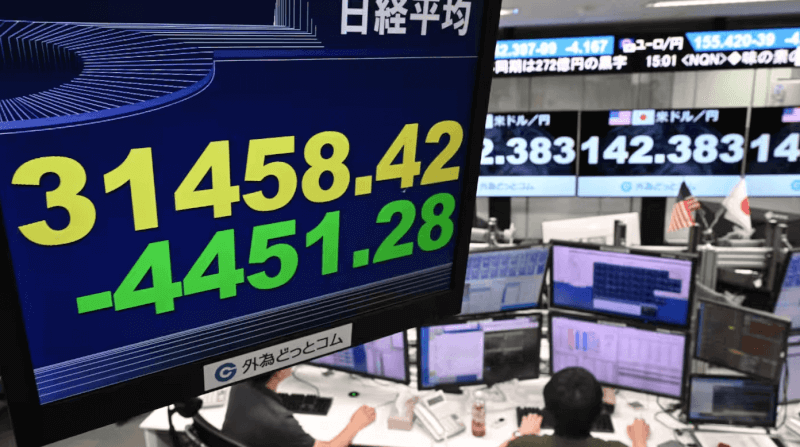Japan’s benchmark Nikkei Stock Average recorded its worst-ever daily sell-off on Monday, losing 4,451.28 points from the previous day’s closing amid panic selling triggered by fears of a possible U.S. recession and the yen’s strength.
The average in Japan’s stock exchange closed down 12.4% to 31,458.42. By percent, it was the second-largest fall since the Black Monday crash of October 1987, when the index lost 3,836.48 points (14.9%), which had been the worst previous decline.
Stocks have been on a downward spiral since Thursday, a day after the Bank of Japan aggressively raised rates to 0.25% from 0.1% and said it was open to more hikes this year. The Nikkei average shed 3.5% on Thursday. The following day the index lost 5.8%, or 2,216.63 points, marking its second-worst daily sell-off.
Japanese financial stocks were hammered on Monday, as it has become “almost impossible” for the Bank of Japan to raise rates under current circumstances, analysts said.

Japanese megabanks plummeted, with Mizuho Financial Group down by 19.7%, Mitsubishi UFJ Financial Group by 17.8%, Resona Holdings by 19.5%, and Sumitomo Mitsui Financial Group by 15.5%.
Regional banks were no exception. Chiba Bank declined by 23.7% and Fukuoka Financial Group by 17.9%. Brokerage giant Nomura Holdings was off 18.6%.
Exporters were hit by the stronger yen, with Toyota down 13.7%.
Trading of Nikkei 225 futures and Topix futures was halted temporarily at Osaka Securities Exchange, the Japanese bourse for derivatives trading, on Monday, as a circuit breaker was triggered. Circuit breakers are usually applied in order to allow investors to calm down when the market is overly volatile.
Japan’s 10-Year Bond Yield Falls To 3-Week Low On US Rate Cut Expectations
The yen strengthened to the 141 level to the dollar Monday, a seven-month high. It had appreciated to the mid-146 level from the higher end of the 148 level in New York trading Friday. That came after a weaker-than-expected July U.S. jobs report stoked recession worries and raised questions about whether the Federal Reserve should have cut rates at its July meeting.
Stocks dropped elsewhere in the Asia-Pacific region. Taiwan’s benchmark TAIEX plunged 8.4% or 1,807.21 points, marking its worst-ever single-day decline, to close at 19,830.88. South Korea’s KOSPI was down by 8.8%.
Tech led the dramatic selloff in Taiwan shares, driven by concerns over a slower economic recovery and delays in Nvidia’s shipments of AI chips.
Shares of leading chipmakers Taiwan Semiconductor Manufacturing Co. and MediaTek plummeted 9.75% and 9.08%, respectively. Foxconn and Quanta, key suppliers that assemble Nvidia’s latest AI servers, also suffered steep losses, closing near their daily downward limit of 10% on the Taiwan Stock Exchange.
Singapore’s Straits Times Index fell more than 4%, and Australia’s All Ordinaries skidded more than 3%.
Bank of Japan Cements A ‘Virtuous Cycle’ As Interest Rates Rise To 0.25%





